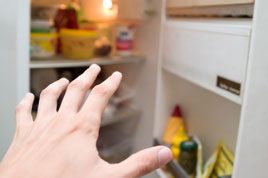Is food addiction real?
Treating food addiction, a mental illness associated with anxiety and trauma, requires treating both mind and body

Source: Best Health Magazine, May 2011
Amidst the everyday chaos of life, food is one of the simplest comforts. But for compulsive eaters, food is an easily accessible drug used in an attempt to fill a constant void. Associated with anxiety and trauma, food addiction is about more than monitoring what you eat, and can have serious health effects.
“Compulsive eating is not about a lack of willpower or knowledge of what to eat,” says Tauri Hall, a counsellor with the Hopewell eating disorder resource centre in Ottawa. “It’s typically a symptom of severe anxiety, diminished self-esteem or unresolved trauma. People with this disorder focus on diets and weight loss, but the underlying issues are not resolved.”
Untreated, adds Diana Norton, also a counsellor with Hopewell, food addiction doesn’t go away. “If you look closely, someone with disordered eating has likely substituted food as a vice to help deal with something else, as others use overwork, alcohol or smoking.”
An individual suffering from binge eating, a characteristic of compulsive eating, engages in frequent episodes of uncontrolled eating, often followed by periods of depression and guilt. Many binge eaters are overweight or obese. Obesity can lead to an array of health issues including type 2 diabetes and coronary heart disease.
- The best treatment involves both mind and body. Here are some options:
- ‘ Behaviour modification or psychotherapy counselling
- ‘ A good nutritionist and a regular exercise routine
- ‘ Meditation, yoga or an alternative spiritual practice to help manage stress
- ‘ Medication (if determined helpful by a doctor)
"Our childhood experiences, including trauma, can create deficits in our ability to cope with the challenges of life," says Hall. “The best way to avoid problems in your children is to help them express feelings. Allow them to have a voice, to know it’s natural to be angry, sad or hurt. Then help them express it in a healthy way, not by building negative habits.”
This article was originally titled "What is this Disorder?" in the May 2011 issue of Best Health. Subscribe today to get the full Best Health experience’and never miss an issue!’and make sure to check out what’s new in the latest issue of Best Health.




